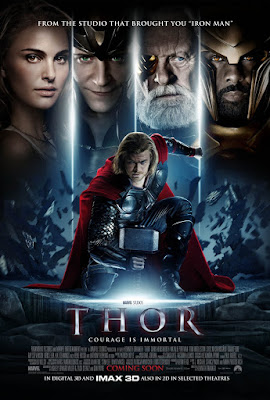 |
| Marvel's The Avengers (2012) |
When Thor villain Loki (Tom Hiddleston) returns at the behest of a mysterious new master, he arrives on Earth as a harbinger of worse things to come. Meant to pave the way for a coming alien invasion, he wastes little time in decimating S.H.I.E.L.D., placing Clint Barton (Jeremy Renner) and Erik Selvig (Stellan Skarsgård, returning from Thor) under some kind of mind control, prompting Nick Fury (Samuel L. Jackson) to finally call in the team he's been building. While Natasha Romanoff (Scarlett Johansson) retrieves Dr. Bruce Banner (portrayed here by Mark Ruffalo, replacing Edward Norton), Phil Coulson (Clark Gregg) approaches Tony Stark (Robert Downey Jr.) and Fury himself ropes in Steve Rogers (Chris Evans). The team comes together to capture Loki, and it isn't long before Thor (Chris Hemsworth) joins the party to round out the cast.
For being such a big, bombastic movie, the plot is relatively straightforward and relies on the tried-and-true "the villain secretly wants to be captured" twist that became so popular in the wake of the The Dark Knight (2008). It's not a hard twist to see coming, which is probably why the film smartly telegraphs this early on. Rather than muddle through an overly complicated plot in a film that is, by nature, stuffed full of characters, The Avengers wisely focuses on those characters and their relationships. This is where all the magic occurs. It's a thrill watching Iron Man butt heads with Captain America, and good fun to see the mighty Thor come to blows with the incredible Hulk. The vast majority of the film is spent letting the team work out the kinks in their internal structure, which is why the finale is such a rousing payoff. When the Avengers finally come together behind Captain America and begin to function like a well-oiled machine, we get the sense that this dream team is unstoppable.
It's hard to fault the film for not taking itself too seriously, because that's never been the point. These films know exactly what they are and what they want to be, and are content to play within the confines of the comic book genre. Perhaps this is the most refreshing approach to the source material, because watching The Avengers feels very much like reading one of the comic books from which these characters and stories are adapted. Just like comic books are not high literature, The Avengers doesn't set out to be the Citizen Kane of the modern era. Because of this, the film comes across as having an unusual amount of confidence in both its characters and execution. I suspect this has a lot to do with the fact that the characters had already been established in the films leading up to this one, and because each of the actors were already comfortable in their respective roles, allowing for a kind of freedom and playfulness not commonly seen in these kinds of big summer blockbusters.
The Avengers is certainly not a perfect film. The final sequence rolls on for a few minutes too long, and the characters (except for Banner) all pretty much reach peak development by the end of the second act. Taken on its own, separate from the continuity of the established MCU, The Avengers has all the depth and nuance of an airbrush painting. It's pretty to look at, but there's not much there by way of substance. Black Widow carries the weight of the most important conversations, the first with Banner, the second with Barton after he's been freed from Loki's mind control. The rest is all sound and color. But, the film isn't exactly meant to be taken on its own. No, it's firmly planted within a specific context, and sort of expects viewers to already be familiar with its characters. If you're looking for character development, this film probably isn't going to satisfy. But if you're just looking to see all of these iconic characters come together in an all-out blockbuster of a flick, then The Avengers is for you.
Marvel and its collaborators struck gold with this film. The cinematic universe only expands after this landmark movie, eventually blossoming into a full-blown cultural phenomenon the likes of which hasn't been seen since the release of the original Star Wars trilogy. Regardless of the numerous movies and sequels that will go on to populate the MCU, none of them will really recapture the magic of The Avengers, when these heroes all assembled on the big screen for the first time.








